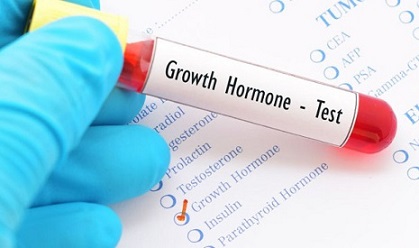COVID-9 News: University Of Texas Study Shows That Low Growth Hormone Secretion Associated With Long COVID Neurologic Symptoms!
Nikhil Prasad Fact checked by:Thailand Medical News Team Oct 09, 2023 2 years, 4 months, 2 weeks, 20 hours, 58 minutes ago
COVID-9 News: The COVID-19 pandemic has had a profound impact on global health, leaving millions of individuals with lingering symptoms even after recovery from the initial infection. Termed "long COVID" or Post-Acute Sequelae of SARS-CoV-2 infection (PASC), these persistent symptoms encompass a wide range of physical and neurological issues, such as fatigue, brain fog, insomnia, anxiety, and depression. In an effort to shed light on the underlying causes of these lingering neurologic symptoms, researchers from the University of Texas Medical Branch in Galveston, USA, collaborated with the University of Pennsylvania and the Centre for Neuro Skills in California, USA, to conduct a case-control observational pilot study.
https://clinicaltrials.gov/study/NCT04860869

The study aimed to investigate whether patients experiencing neurologic symptoms, such as fatigue and cognitive impairment, in the aftermath of COVID-19 recovery exhibited persistent low secretion of growth hormone (GH). The research also delved into the potential links between GH secretion, other biomarkers, and the severity of PASC symptoms.
Thailand Medical News had in a past
COVID-19 News coverage shown that SARS-CoV-2 infections lead to impairment of secretion of growth hormone and which contributes to disease severity and also Long COVID issues.
https://www.thailandmedical.news/news/sars-cov-2-causes-impairment-of-human-growth-hormone-secretion-that-can-lead-to-disease-severity-and-long-covid-issues-hgh-supplementation-can-help
Understanding Long COVID and Its Heterogeneity
Long COVID, or PASC, has emerged as a complex and multifaceted condition, affecting both individuals who experienced severe acute COVID-19 infections and those with milder or asymptomatic cases. Its variability in symptoms and lack of clear diagnostic criteria have posed challenges for clinicians and researchers alike.
Symptoms associated with PASC can encompass not only neurological issues but also somatic manifestations like chest pain, weakness, gastrointestinal discomfort, breathlessness, and reduced exercise tolerance. Various underlying pathologies have been proposed, including lingering inflammation, persistent viral reservoirs, autoimmunity, microbiome dysbiosis, and blood microclots.
This heterogeneity suggests that PASC may not be a single, distinct condition but a group of syndromes triggered by a common infectious event. With more than half of COVID-19 survivors experiencing lingering symptoms, there is an urgent need for evidence-based guidance on diagnosing and treating PASC.
Fatigue and Cognitive Impairment in Long COVID
Fatigue and cognitive impairment are among the most common and distressing symptoms reported by individuals with PASC. These neurological symptoms often co-occur, leading to the colloquial term
"brain fog." Interestingly, similar symptoms are observed in patients recovering from other infectious diseases, such as myalgic encephalomyelitis/chronic fatigue syndrome (ME/CFS), and various inflammatory and autoimmune conditions. This parallel suggests that these symptoms may share common underlying mechanisms.
Notably, patients with brain injury-associated fatigue and altered cognition (BIAFAC) have been found to exhibit abnormally low GH secretion, and their symptoms improved with GH treatment. This raised questions about whether GH secretion might also play a role in PASC-related neurologic symptoms.
The Connection Between GH and Long COVID
The study in question aimed to explore the potential connection between GH secretion and PASC-related fatigue and cognitive impairment. To achieve this, researchers conducted a case-control observational pilot study involving two groups: PASC patients (n=10) who experienced lingering neurologic symptoms at least six months after initial COVID-19 infection and non-PASC patients (n=13) who had fully recovered from COVID-19 without persistent symptoms.
The findings revealed that PASC patients reported significantly worse scores on questionnaires assessing fatigue, sleep quality, depression, and quality of life compared to non-PASC patients. Despite the self-reported cognitive issues, cognitive testing did not reveal significant differences between the two groups. Notably, PASC patients exhibited no association between their neurologic symptoms and inflammatory markers or adrenal insufficiency. However, there was a clear link between PASC-related neurologic symptoms and reduced GH secretion.
Implications and Future Directions
The results of this pilot study provide valuable insights into the potential role of growth hormone secretion in the persistence of neurologic symptoms in PASC patients. While the study had a small sample size, its findings suggest a promising avenue for further research into the underlying mechanisms of long COVID.
Understanding the connection between disrupted GH secretion and PASC-related symptoms could open doors to targeted treatments that alleviate the suffering of affected individuals. Future studies with larger cohorts and more comprehensive assessments of GH function are needed to confirm these findings and explore potential therapeutic interventions.
Conclusion
Long COVID, or PASC, remains a challenging and poorly understood condition, characterized by a wide array of symptoms affecting both the body and the brain. This pilot study conducted by researchers from the University of Texas Medical Branch, the University of Pennsylvania, and the Centre for Neuro Skills has shed light on a potential link between PASC-related neurologic symptoms and reduced growth hormone secretion.
While further research is needed to confirm and expand upon these findings, the study represents a significant step toward unraveling the complexities of long COVID and providing hope for effective treatments in the future. With millions of individuals worldwide grappling with the long-term consequences of COVID-19, the quest to understand and mitigate the effects of this debilitating condition continues to be of utmost importance.
The study findings were published in the peer reviewed journal: Molecular and Cellular Endocrinology.
https://www.sciencedirect.com/science/article/abs/pii/S0303720723002228
For the latest
COVID-19 News, keep on logging to Thailand Medical News.
Read Also:
https://www.thailandmedical.news/news/thailand-medical-news-warns-that-covid-19-infections-and-covid-19-vaccines-can-cause-pituitary-apoplexy-and-possibly-pituitary-adenomas
https://www.thailandmedical.news/news/growth-hormone-releasing-hormone-antagonist-mia-602-inhibits-inflammation-induced-by-sars-cov-2-spike-protein-in-macrophages-and-pbmcs-
https://www.thailandmedical.news/news/breaking-news-italian-study-reveals-that-sars-cov-2-is-able-to-affect-the-pituitary-gland-leading-to-possible-hypopituitarism-and-a-variety-of-disorde
